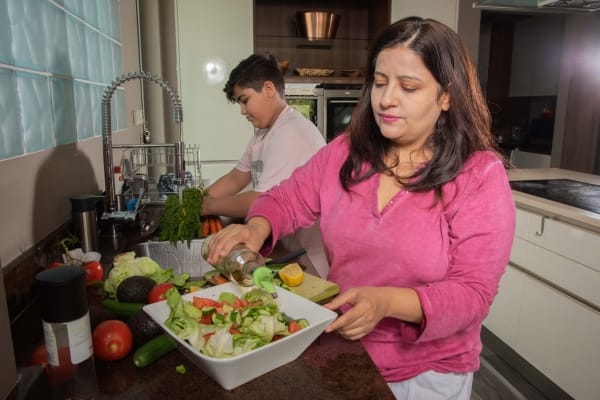Today’s post comes from Nadia Browne. Nadia is a Registered Dietitian and a PhD candidate in the Department of Pediatrics at the University of Alberta. She is also the outgoing Vice-Chair of the OC-SNP National Executive.
In Canada, one in three children is living with overweight or obesity1. Children who are living with the chronic disease obesity are at an increased risk for many health problems. Therefore, preventing obesity in adolescents should be a public health priority. More tailored approaches to obesity prevention in adolescents are needed to understand the role motivation plays in pediatric weight management.
Motivation is considered an important step towards changing health behaviour and managing adolescent obesity. It refers to a person’s desire and drive for change2. Adolescent motivation for change could be due to intrinsic [internal] (e.g., improved health, spiritual, self-esteem) or extrinsic [external] (e.g., social, family, financial incentives) factors3,4. Research has shown that intrinsic motivation is associated with changes in health behaviour in the long-term3. Thus, in weight management programmes, it’s critical for clinicians to understand that adolescents vary in their motivation and clinicians should assess motivation to change health behaviours.
A key to weight management in adolescents living with obesity is motivation. As motivation changes over time, it is important to identify adolescents in weight management programmes who can benefit from well-designed obesity interventions to enhance motivation. For adolescents to achieve behaviour change, they must first be motivated. Overall, this enhanced motivation can potentially lead to a reduction in the incidence of adolescent obesity.
Assessing motivation for behaviours change in adolescents living with obesity is crucial for clinicians to better tailor weight management programmes, increase the effectiveness of adolescent obesity interventions and reduce programme attrition. To date, no evidence exists on valid and reliable tools to assess the motivation of adolescents living with obesity before, during or after weight-management programmes. This is a critical gap in the delivery of health services to manage adolescent obesity.
Considering the lack of validated tools, the Readiness and Motivation Interview for Families (RMI-Family), a tool (semi-structured interview) to assess motivation in families (adolescents living with obesity and their parents) was developed5. A pilot was tested in a pediatric weight management clinic. The study findings indicated that the RMI-Family can be a useful tool for assessing families’ motivation. As such, research remains ongoing to determine the psychometric properties of the RMI-Family in predicting clinically meaningful outcomes in adolescent weight management. In 2017, the RMI-Family “full” study commenced and aimed to provide evidence to show the RMI-Family is a psychometrically sound tool for assessing motivation in families6. The RMI-Family will be beneficial to clinicians in tailoring weight management programmes.
As weight-related issues in adolescents are likely to continue into adulthood, it’s imperative that clinicians understand the role motivation plays in the treatment of adolescents living with obesity. Furthermore, research on validated tools to assess motivation in adolescents is needed to distinguish persons who would benefit from weight management interventions. These research findings can have implications for clinicians as they seek to improve the effectiveness and efficiency of adolescents’ weight-management programmes. Additionally, research on motivation is necessary to optimize health services thereby contributing to positive health behaviour changes in adolescents living with obesity.
References
- Rodd, C., & Sharma, A. K. (2016). Recent trends in the prevalence of overweight and obesity among Canadian children.CMAJ, 188(13), E313-E320.
- Geller, J., Cockell, S. J., & Drab, D. L. (2001). Assessing readiness for change in the eating disorders: the psychometric properties of the readiness and motivation interview.Psychological assessment, 13(2), 189.
- Bower, P., Rowland, N., & Hardy, R. (2003). The clinical effectiveness of counselling in primary care: a systematic review and meta-analysis.Psychological medicine, 33(2), 203-215.
- West, R. (2005). Time for a change: putting the Transtheoretical (Stages of Change) Model to rest.Addiction, 100(8), 1036-1039.
- Geller, J., Avis, J., Srikameswaran, S., Zelichowska, J., Dartnell, K., Scheuerman, B., … & Ball, G. (2015). Developing and pilot testing the readiness and motivation interview for families in pediatric weight management.Canadian Journal of Dietetic Practice and Research, 76(4), 190-193.
- Ball, G. D., Spence, N. D., Browne, N. E., O’Connor, K., Srikameswaran, S., Zelichowska, J., … & Morrison, K. M. (2017). The readiness and motivation interview for families (RMI-Family) managing pediatric obesity: study protocol.BMC health services research, 17(1), 261.
Photo credit: World Obesity Federation






